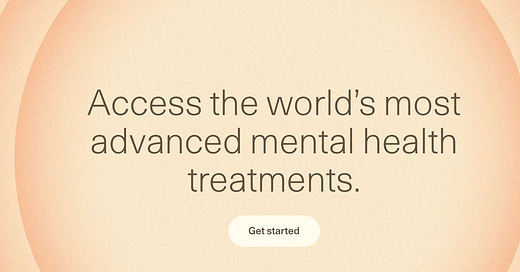NEWS BLAST! COMP360, HHS wants to simplify Prior Auth, Radial is Here, and I'm Back on The Carlat Podcast!
It's a lot for one day.
This is a big news day for Owen and my readers.
First, my recent paper on Tardive Dyskinesia (TD) detection, called TDetect, was featured on the popular Carlat Psychiatry Podcast (Minute 8:30). As a reminder, TDscreen.ai is free to use. Chris is a great psychiatrist who makes some crucial points about the role of antipsychotic treatment in mood disorders. Listen, or regret not doing so, profoundly.
Second, COMP360, a synthetic form of psilocybin, which I’ve written about extensively in this paper, met its primary endpoint in one of its two FDA approval trials (from the Compass/pathways press release):
Efficacy Data (MADRS): Single dose of COMP360 25 mg versus placebo with a mean treatment difference of -3.6 points, 95% CI [-5.7, -1.5]; p<0.001
Safety Data (statement provided by the DSMB chair) : Based on the latest review of the data for the 005 and 006 studies, safety findings are consistent with previous studies of COMP360 and there are no new or unexpected safety findings. From this review of the data, there is no evidence of a clinically meaningful imbalance between treatment arms in suicidality in either study. 4
A confidence interval (CI) that doesn’t cross 0 means it’s “real.” This is a big finding. It is also a much smaller scale result than the open-label data that preceded it…quoting a paper I senior authored, along with colleauges like Burton Tabaac in the first author chair:
That being said, at 6 weeks, there were pronounced differences in ratings on 3 other scales of depression symptoms—Hamilton Depression Rating Scale, 17-item (HAM-D-17), Montgomery-Åsberg Depression Rating Scale (MADRS), and Beck Depression Inventory (BDI)—although these secondary outcomes were not corrected for multiple comparisons. The remaining 2 MDD trials were both placebo-controlled and administered a single, moderate dose of psilocybin in conjunction with psychological support. One enrolled 52 patients with MDD and found that psilocybin caused remission in 54% of participants, where remission is defined as a score of less than 10 on the MADRS scale.73 The most recent study, a phase II clinical trial that enrolled 104 patients with MDD, determined that psilocybin was associated with a remission rate of 25% (MADRS <10) at 6 weeks after the treatment, although this effect was insignificant.74 Nevertheless, a significant proportion of participants (41.7%) exhibited a sustained antidepressant response to psilocybin.
I find this reassuring—it’s still significant, but when we account for the placebo response, like any real treatment, it appears less “totally amazing.” GOOD. It’s a real treatment, not a magic pill. That makes me suspect that the blind were held up, and that the trial was run appropriately. Keep in mind, in Treament-refractory depression, we have lower placebo response rates generally. This is an outcome I can believe, and I look forward to reading the paper, impatiently. Congrats, Compass team. This is a serious achievement.
Third, and who knows what to make of this, but according to Bobby Kennedy and Mehmet Oz (Hello, thanks for reading!) we have an announcement from HHS and CMS that a new day is almost here, sorta, when it comes to prior authorization.
They have pledged to fix prior authorization! Here is what they highlighted, with a bunch of payors, like reluctant teenage boys asked to hold out till marriage, included in the press release:
“These commitments represent a step in the right direction toward restoring trust, easing burdens on providers, and helping patients receive timely, evidence-based care,” said Administrator Oz. “We applaud these voluntary actions by the private sector, which is how these types of issues should be solved. CMS will be evaluating progress and driving accountability toward our shared goals, as we continue to champion solutions that put patients first.”
Participating health insurers have pledged to:
Standardize electronic prior authorization submissions using Fast Healthcare Interoperability Resources (FHIR®)-based application programming interfaces.
Reduce the volume of medical services subject to prior authorization by January 1, 2026.
Honor existing authorizations during insurance transitions to ensure continuity of care.
Enhance transparency and communication around authorization decisions and appeals.
Expand real-time responses to minimize delays in care with real-time approvals for most requests by 2027.
Ensure medical professionals review all clinical denials.
The aforementioned frustrated and on the edge of their seats teenagers, sorry, health plans, include:
Aetna, Inc., AHIP, Blue Cross Blue Shield Association, CareFirst BlueCross BlueShield, Centene Corporation, The Cigna Group, Elevance Health, GuideWell, Highmark Health, Humana, Inc., Kaiser Permanente, and UnitedHealthcare.
Much like the purity pledge for teens, we will see if health plans can hold it together or will resort to other solutions.
Please click that link, just to understand how hard I have worked not to make some very dirty jokes. You know, because I respect the virtue of my readers.
Greetings, if you (or a loved one) are looking for relief from depression, OCD, anxiety, PTSD, Bipolar Disorder, or other conditions, feel free to explore care with Radial—it’s the company of which I’m a co-founder, delivering the most advanced mental health care on earth. If you are looking for help, Radial offers the most advanced mental health care.





Good god that is a big day.
Kudos to radial, excited to see more from it